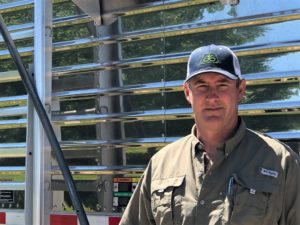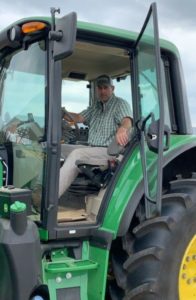
Justin Castleberry of Gainesville, Georgia, currently serves as the chairman of the Hall County FSA Committee.
By Lauren Moore, USDA
The nomination period for the USDA Farm Service Agency’s (FSA) annual county committee election began June 15 and continues through Aug. 1, 2020. Throughout the nomination period, we’ll be introducing county committee members across the nation. This week meet Justin Castleberry of Gainesville, Georgia. Justin is currently the chairman of the Hall County FSA Committee.
Justin grew up farming and has been a full-time farmer since 1995. He operates a poultry, beef, row crop and produce operation, in addition to a trucking business that hauls feed and grain. His farm is home to over 100 cattle and consists of four broiler houses that house around 80,000 chickens. He grows wheat, soybeans, corn, hay, watermelons and pumpkins each year.
Serving Local Farmers
While Justin is a sixth-generation farmer, he is also a third-generation FSA county committee member. Justin’s father and grandfather have both previously served as committee members.
“It’s kind of a tradition,” he said. “I think most farm kids want to do what their parents did. It was as much tradition as anything to me.”
County committee members are farmers elected by their peers to serve as a direct link between the agricultural community and USDA. Farmers on the committee help deliver FSA farm programs at the local level, help decide the kind of programs their counties will offer, and work to make FSA agricultural programs serve the needs of local producers.
Each year, FSA accepts nominations for a certain Local Administrative Area (LAA) and the LAA up for election rotates each year.
“County committees give a voice to local farmers that otherwise might not have access to,” said Justin. “Some of the older farmers aren’t as in touch with technology as some of the younger generations are. Having someone at the local level to help get the word out on programs, how they’re implemented and what they need to do to take part is valuable.”

Justin is a third-generation FSA county committee member.
USDA Participation
Over the years, Justin has participated in multiple FSA programs, including the Noninsured Crop Disaster Assistance Program, Livestock Forage Program, and the Agriculture Risk and Price Loss Coverage programs. He also works heavily with USDA’s Natural Resources Conservation Service through the Environmental Quality Incentives Program to add cross fencing and water troughs for alternate watering.
“USDA programs have provided technical assistance on managing our land and waterways. They’ve also provided financial assistance during years when we took a hit because of drought or when we are experiencing depressed prices,” said Justin. “It’s assistance that helps keep us in business another year.”
More Information
For more information on FSA county committee elections, contact your local FSA office or visit fsa.usda.gov/elections.





